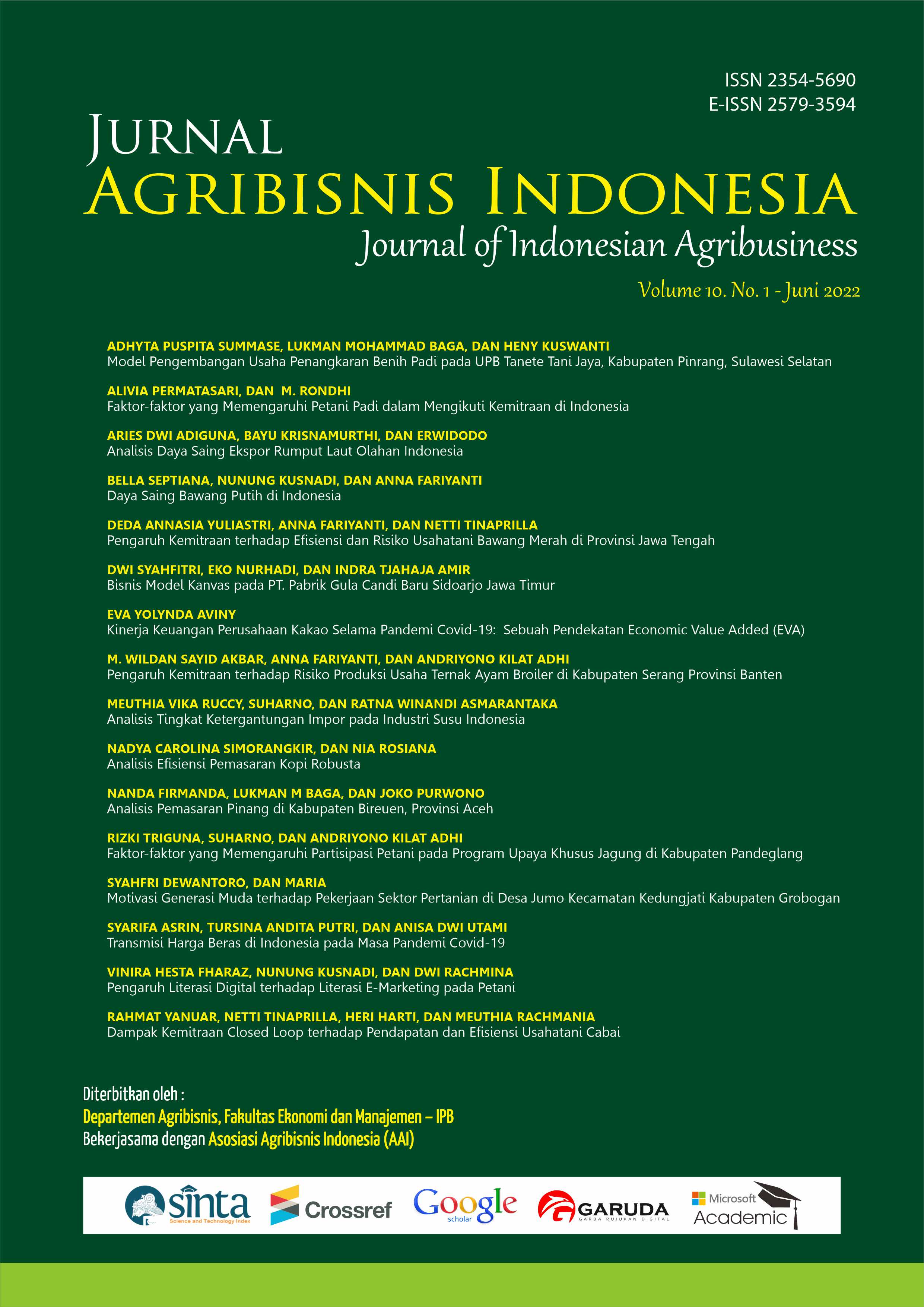Kinerja Keuangan Perusahaan Kakao Selama Pandemi Covid-19: Sebuah Pendekatan Economic Value Added (EVA)
Main Article Content
Abstract
The Covid-19 pandemic brings around a multidimensional crisis that sway the world’s economy and believed to affect the performance of any industry. Cocoa processing industry, which is well known greatly contributes to Indonesia’s economy, is one of industry that is suspected has a significant effect to the performance of Indonesia’s economy. As one of export commodity, during the pandemic (2019-2020) the cocoa processing industry contributed for about USD 548 million to total Indonesia’s foreign exchange. This lead to a question: does the increase implies that the cocoa processing industry has a good financial performance? Therefore, this study aims to evaluate the financial performance of two cocoa processing company before and during Covid-19 pandemic by occupying the financial report of PT Bumi Teknokultura Unggul TBK and PT Wahana Interfood Nusantara from 2018 till 2020. The Economic Value Added approach was used to evaluate the financial performance of both company. The result of Economic Value Added (EVA) Analysis confirmed that this pandemic seem affecting the financial performance of the two company, which is both company’s performance tend to decrease. Yet, a different performance between the two was depicted as well by EVA, in which the EVA of PT Wahana Interfood Nusantara is positive while the PT Bumi Teknokultura Unggul Tbk’s is negative. This implies that PT Wahana Interfood Nusantara has a better financial performance than PT Bumi Teknokultura Unggul Tbk.
Downloads
Article Details

This work is licensed under a Creative Commons Attribution 4.0 International License.
Jurnal Agribisnis Indonesia (JAI) is an Open Access Journal. The authors who publish the manuscript in this journal agree to the following terms:
Creative Commons License
JAI is licensed under a Creative Commons Attribution 4.0 International License. This permits anyone to copy, redistribute, remix, transmit, and adapt the work provided the original work and source are appropriately cited.
This means:
(1) Under the CC-BY license, authors retain ownership of the copyright for their article, but authors grant others permission to use the content of publications in Jurnal Agribisnis Indonesia in whole or in part provided that the original work is properly cited. Users (redistributors) of JAI are required to cite the original source, including the author's name, JAI as the initial source of publication, year of publication, volume number, issue, and Digital Object Identifier (DOI); (2) Authors grant JAI the right of first publication. Although authors remain the copyright owner.
References
Asante-Poku, N.A., S. van Huellen. (2021). Commodity exporter’s vulnerabilities intimes of COVID-19: the case of Ghana. Canadian Journal of development Studies Vol 42, issue 1-2.
Brigham, E.F, M.C. Ehrhardt. 2007. Financial Management: Theory and Practice. Ed 12th. Thomson South-Western. USA
Devi, S., N.M. S. Warasniasih, P.R. Masdiantini, L.S. Musmini. (2020). The Impact of COVID-19 Pandemic on the Financial Performance of Firms on the Indonesia Stock Exchange. Journal of Economics, Business and Accounting Ventura, 23(2).
Dewi, M. (2017). Penilaian Kinerja Keuangan Perusahaan dengan Menggunakan Metode EVA (Economic Value Added) (Studi Kasus pada PT Krakatau Steel Tbk Periode 2012-2016). Journal Manajemen dan keuangan, 6(1).
Fahmi, I. 2012. Analisis Kinerja Keuangan. Alfabeta. Bandung
Gitman, L.J. 2000. Principles of Managerial Finance. Addison-Wesley. San Diego
Gulo,W.A. dan W.J. Ermawati. (2011). Analisis Economic Value Added (EVA) dan Market Value Added (MVA) sebagai Alat Pengukur Kinerja Keuangan PT SA. Jurnal Manajemen dan Organisasi, 2(2).
Indayani, S. dan B. Hartono. (2020). Analisis Pengangguran dan Pertumbuhan Ekonomi sebagai Akibat Pandemi Covid-19. Perspektif: Jurnal Ekonomi dan Manajemen Univ. Bina Sarana Informatika, 18(2).
Irawan, F. dan N.Y. Manurung. (2020). Analisis Economic Value Added (EVA) dan Market Value Added (MVA) sebagai Alat Ukur Kinerja Keuangan PT Garuda Indonesia Tbk Tahun 2017-2019. Journal Pajak dan keuangan Negara, 2(1).
Kasmir. 2008. Analisis Laporan Keuangan. PT Rajagrafindo. Jakarta
Kubiczek, J. & W. Derej. (2021). Financial Performance of Business in The Covid-19 Pandemic Conditions-Comparative Study. Polish Journal of Management Studies. 24(1).
Kurniawan, M.A., K.E. Hariadi, W.O. Sulistyaningrum, & A.B. Kristanto. (2021). Pandemi COVID-19 dan Prediksi Kebangkrutan: Apakah Kondisi Keuangan Sebelum 2020 Berperan?. Jurnal Akuntansi, 13(1).
Modjo, MI. (2020). Memetakan Jalan Penguatan Ekonomi Pasca Pandemi. The Indonesian Journal of Development Planning, 4(2).
Narayanan, S. dan S. Saha. 2020a. Urban food markets and the lockdown in India. Working Paper WP-2020-017. Indira Gandhi Institute of Development Research. http://www.igidr.ac.in/pdf/publication/WP-2020-017.pdf.
Narayanan, S. dan S. Saha. (2020b). More Reform than Relief: Indian Agriculture and The Pandemic. The Indian Journal of Labour Economics Vol 63 Suppl 1.
Pratinda, W.N.A.S dan R. Harta. (2021). Analysis of Indonesia’s Plantation Subsector Export Performance and the Covid-19 Pandemic: IPB University. JURNAL EKONOMI DAN KEBIJAKAN PEMBANGUNAN, 10(2), 114-133.
Sawir, A. 2015. Analisa Kinerja Keuangan dan Perencanaan Keuangan Perusahaan. PT Gramedia Pustaka Utama. Jakarta.
Stern, J.M., J.S. Shiely & I. Ross. 2001. The EVA Challenge: Implementing Economic Value Added Cange in Organization. Johw Wiley and Sons Inc.
Tahu, G.P., A. Yuesti. 2021. Analyzng the Effect of Covid-10 Pandemic on The Financial Performance of Indonesian Listed Company.
Tandelilin, E. 2010. Portofolio dan Investasi: Teori dan Aplikasi. Ed 1st . Kanisius. Yogyakarta.
Tikasari, N. dan D.A. Surjandari. (2020). The Effect of Economic Value Added and Financial Performance on Stock Return. Saudi Journal of Business and Management Studies, 5(6).
Wijayanti, H., G. Widhiyoga, dan U.N. Madyar. (2022). Dampak Pandemi bagi Global Value Chain Industri Kakao Indonesia. Jurnal Akutansi dan Manajemen, 15(1).
Wulandari, A. dan D. Patrisia. 2020. Compa-rative analysis of financial performance before and during the covid-19 pandemic using profitability, liquidity, solvency and economic value added (EVA) ratio in go public companies listed on the Indonesia Stock Exchange (study on restaurant, hotel & tourism sub-sektorsektor period January 2019–December 2020). Financial Management Studies 4(1) p 47-59.

